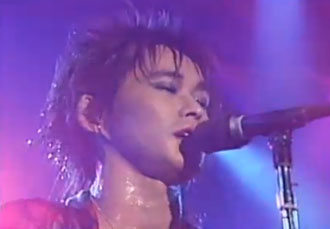Japanese anti-nuclear songs recorded to protest nuclear power after the Chernobyl disaster are now going viral after mainstream media refused to give them air time.
Some of the songs from 1988 are taking on a prophetic ring today.
“More nuclear power plants standing right there/ Before I knew it, they were leaking,” sang the band RC Succussion, in their 1988 version of Eddie Cochran’s “Summertime Blues.”
A Kanto region radio station began receiving lots of requests for that one, along with another anti-nukes cover.
Meanwhile, the crisis moved rock singer Kazuyoshi Saito to cover one of his own songs with entirely new lyrics: “Zutto Uso Datta” (It was always a lie).
The lyrics angrily criticize the government and Tokyo Electric Power Co. for spinning lies in TV ads and school textbooks.
While the mainstream media is “voluntarily restraining” from airing the songs, video clips of the songs have gone viral on the Internet, getting play after play on sites such as YouTube.
“When you walk across this country, you’ll find 54 nuclear reactors/ All the textbooks and TV commercials used to say they were safe/ They cheated on us, and their excuse was that it was ‘unexpected,’” Saito sings in Japanese.
“It was always a lie/ It came to light after all/ Really, it was all a lie/ ‘Nuclear power is safe.’ “
The song borrows the tune of Saito’s “Zutto Suki Datta” (I always loved you). In his video, posted on a video-sharing website on April 7, Saito plays blues licks on an acoustic guitar as he sings.
Saito’s record label, Victor Entertainment Inc., requested the website operator delete the video clip because it was “a video meant for private use that was leaked in a way he did not intend.”
The operator complied. But users who saw the clip made copies and posted them on other sites. It is still widely available in cyberspace.
According to Saito’s agency, the musician shot the video himself. After discussions among Saito, his agency and the record company as to whether it should be publicly released, the decision was made not to, so as to avoid opposition from “related companies” and show respect for differences of opinions on the issue.
Details of what they meant by “related companies” have not been not disclosed.
However, Victor Entertainment’s parent company is an electronics manufacturer. The original tune was made as a tie-in to an ad campaign for a leading cosmetics maker.
Saito has not publicly commented on the matter.
Meanwhile, two songs from RC Succession’s 1988 album “Covers” are receiving renewed interest: “Summertime Blues” and a cover of Elvis Presley’s “Love Me Tender.” The latter too has rewritten Japanese lyrics that pointedly criticize the nuclear power industry.
They were written after the 1986 Chernobyl nuclear power plant disaster by Kiyoshiro Imawano, the late frontman of the band. He died of cancer in 2009.
In “Love Me Tender,” he croons, “I don’t need radiation/ I just wanna drink milk.”
In “Summertime Blues,” Imawano sings: “When I swam in the middle of nowhere/ I found a nuclear power plant/ For what? I just don’t get it/ It’s the summertime blues for a small Japan.”
In 1988, the band’s record label, EMI Music Japan Inc., (then known as Toshiba EMI), canceled release of the album without giving specific reasons. It ran a newspaper ad to announce that the songs were “too great to release.”
The album was later released by another company.
Music critic Peter Barakan, who hosts the InterFM radio program “Barakan Morning,” said his show had received the most requests for the two songs in its history.
Barakan felt impelled to play them, and aired “Summertime Blues.”
However, after hearing from Inter-Wave Inc., which owns the radio station, he decided not to play “Love Me Tender.”
The song mentions milk, and they thought it perhaps wasn’t the right time to air it because it could feed rumors regarding milk consumption.
Instead, Barakan asked his listeners: “It is easily available on the Internet, so please tell us how you feel about it.”
The radio show received many comments, he added. While one listener said they “should have played” the song, another commented: “If Kiyoshiro were still alive, I think he’d sing something different in a situation like this.”


